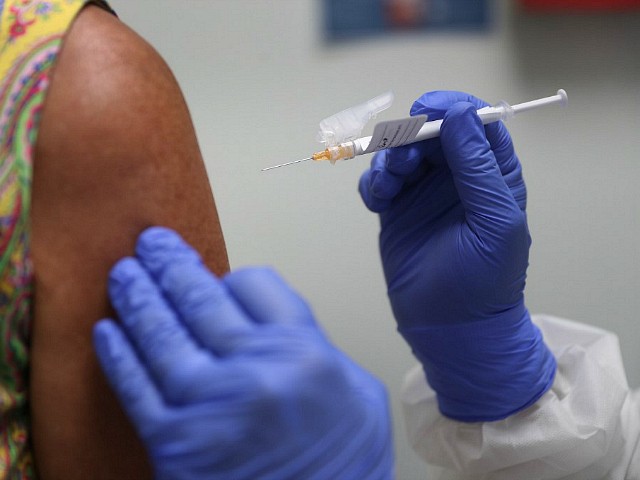Chinese state media reported on Tuesday that Chinese mRNA coronavirus vaccines will enter Phase III clinical trials in May and will be ready to ship 120 million doses by the end of the year.
A political feud broke out in the Chinese Communist Party this week after a doctor admitted China’s existing vaccines are not very effective.
The doctor in question, director Gao Fu of the China Centers for Disease Control, said current Chinese vaccines “don’t have very high protection rates” and suggested better results could be obtained with mRNA technology.
Traditional vaccines introduce a weak or dead sample of the virus into a patient’s body, provoking an immune response that helps the patient resist exposure to the full-strength live virus.
The new generation of mRNA, or “messenger RNA,” vaccines program the patient’s body to create a protein that simulates the presence of a virus and then help the body develop the necessary immune response. mRNA treatments do not employ samples of the live virus and can be manufactured more quickly in laboratories.
According to China’s state-run Global Times, vaccine developer Suzhou Abogen Biosciences already has an mRNA product called ARCoV, comparable to the coronavirus vaccines from Pfizer and Moderna, in late clinical trials.
Company founder Ying Bo claimed his product is “fairly competitive with the other two mainstream mRNA vaccines in overseas markets.” The Chinese Academy of Military Medical Sciences, co-developer of the vaccine, claimed it can be stored at room temperature for up to seven days, reducing the cost and difficulty of transporting refrigerated medicines.
The Global Times portrayed Ying’s remarks as “another step forward in China’s vaccine development despite attacks from Western media on the efficacy of Chinese doses.”
The Chinese Communist paper dismissed criticisms of China’s earlier vaccine products, claimed people in other countries are lining up to get Chinese shots, and even threw in an insinuation that critiques of their effectiveness flow from anti-Asian racism:
Organizations such as the American Chamber of Commerce in China (AmCham China) have also been helping to organize vaccinations for foreign nationals in Beijing, a person familiar with the matter confirmed to the Global Times on Tuesday. The chamber is advocating for open market access for all vaccines in China, while also supporting policies that lead to a loosening of travel restrictions, the person said.
Keri-Lee Beasley, a coach at the Western Academy of Beijing: International School in Beijing, who got her first dose on Monday, described the process in a tweet.
“The volunteers were so helpful – translating for us, ensuring we understood the forms, escorting us through each section. Do Asian people living in Western countries get the same treatment? Why the hell not?”
Chinese vaccine maker CanSino Biologics on Wednesday claimed there have been no blood clotting responses to its product. The U.S. Food and Drug Administration (FDA) called for a pause in the distribution of the vaccine manufactured by U.S. company Johnson and Johnson on Tuesday because six cases of severe blood clotting were reported among the 6.8 million people who have received the vaccination. The vaccine produced by British-Swedish firm AstraZeneca has also experienced very rare complaints of blood clotting.
